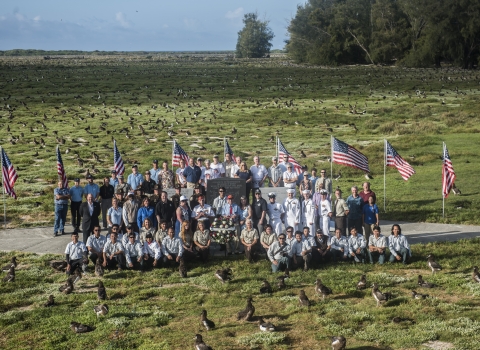On Feb. 12, 1974, Judge George Boldt issued a decision in a case of the United States v. State of Washington. This became known as the “Boldt Decision,” which affirmed Tribes’ treaty reserved rights to half the catch of salmon and steelhead fisheries, with the Tribes and state managing the fisheries together. This decision paved the way toward the co-management of culturally important fisheries that we are a part of today, and the numerous ways we continue to uphold our Tribal trust responsibilities.
In the Pacific Region, we work closely with Tribes at co-managed fish hatcheries to restore and enhance depleted salmon and steelhead runs on Tribal and adjacent lands for Tribal cultural and subsistence use, sport and commercial harvesting, and continued health of the ecosystem. Tribal co-management in the Region includes, but is not limited to, Tribal assumption of management and operations of Dworshak and Kooskia National Fish Hatcheries located on the Nez Perce Tribe’s Reservation.
We also work with Tribes to secure funding for fish passage fish passage
Fish passage is the ability of fish or other aquatic species to move freely throughout their life to find food, reproduce, and complete their natural migration cycles. Millions of barriers to fish passage across the country are fragmenting habitat and leading to species declines. The U.S. Fish and Wildlife Service's National Fish Passage Program is working to reconnect watersheds to benefit both wildlife and people.
Learn more about fish passage and habitat restoration projects such as the Walúula Floodplain Restoration Design Project at McNary National Wildlife Refuge. A partnership between the Confederated Tribes of Umatilla Indian Reservation and U.S. Fish and Wildlife Service, the project will reconnect the last 6 miles of the Walla Walla River with approximately 1,500 acres of historic floodplain. More than improving habitat for ESA-listed species such as Mid-Columbia summer steelhead, bull trout and Pacific lamprey, reconnecting river and floodplain will improve ecosystem function and increase its resilience in a changing climate, provide enhanced fishing areas for Tribes and others and increase access to First Foods. Incorporating Indigenous traditional knowledge into the planning, the first steps of the project are underway with financial support for the conceptual design from the state of Washington. Additionally, the Bipartisan Infrastructure Law Bipartisan Infrastructure Law
The Bipartisan Infrastructure Law (BIL) is a once-in-a-generation investment in the nation’s infrastructure and economic competitiveness. We were directly appropriated $455 million over five years in BIL funds for programs related to the President’s America the Beautiful initiative.
Learn more about Bipartisan Infrastructure Law has provided $675,000 to support the ecosystem restoration project.
“We were pleased with the Belloni decision in 1969 and then again pleased with the Boldt decision in 1974. It reaffirmed our sovereignty. It reaffirmed that we have the right to catch our fish in all our usual and accustomed places. And that the states have limited power over regulating tribes. In salmon recovery, over the years since then, we have learned that we can’t do this alone, we have to do it together. True partnership is what need to rebuild our natural resources. We must listen as much as we need to speak to each other. We must seek solutions together.” - Kat Brigham, former chair of the Confederated Tribes of the Umatilla Indian Reservation Board of Trustees.





